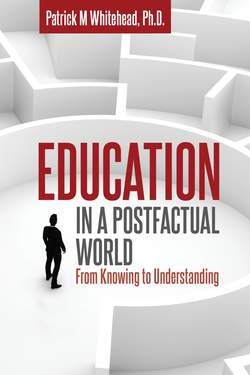Читать книгу Education in a Postfactual World - Patrick M. Whitehead - Страница 7
На сайте Литреса книга снята с продажи.
ОглавлениеAcknowledgements
Iam grateful to the graduate education that I received in the department of psychology at the University of West Georgia (UWG). A few names that come to mind are Chris Aanstoos, Neill Korobov, John Roberts, Hans Skott-Myhre, Eric Dodson, Lisa Osbeck, and John Kim, not to mention the many fellow graduate students that helped me sort through novel ideas at various bars in Carrollton, Georgia. While at UWG, I received more than an education: I learned how to take responsibility for my own learning. This supplied the freedom and flexibility to challenge the academic disciplines that I had found so compelling. This book has been a way for me to organize my thoughts about philosophy, education, and science, as they changed throughout my education. By reading this book, my hope is that college students can feel a bit of the freedom in inquiry and learning that I was fortunate enough to experience first-hand.
Since most of these chapters came together while I was a graduate student, many of them have parts that have been presented at various conferences (which subsequently helped to shape the focus and significance of my arguments). I would like to acknowledge my debt to these conferences.
Chapter 3 came from a paper titled “The heuristic method revisited: The lasting impression of Cézanne’s Doubt,” presented at the International Human Science Research Conference in Montreal, Quebec, June 25–29 (2012).
Chapter 7 came from a paper titled “Schooling as an Ideological State Apparatus,” presented at the Southeast Philosophy of Education Conference in Atlanta, Georgia, February 21–22 (2014).
Chapter 8 came from a paper titled “The effects of student-centered learning on problem-solving abilities: A neurobiological consideration,” presented at the Southeast Philosophy of Education Conference in St. Petersburg, Florida, February 1–2 (2013).
I would like to thank Jamie Barker and Gary Senecal for contributing the Foreword and Afterword, respectively, and again thank Jamie for his help with revisions. Finally, I would like to thank Jeff Young, and the editorial staff at BrownWalker Press, for helping get this project into its final form.
